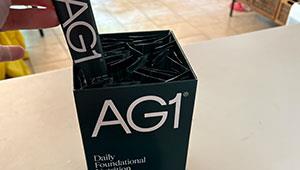Hidden Fat Fact 4
Visceral fat undermines your manhood.There's a concrete connection between testosterone and visceral fat, and it works in two ways, says Farid Saad, Ph.D., head of scientific affairs for Men's Healthcare at Bayer Pharma in Berlin, Germany.
First, inadequate testosterone levels direct muscle cells to turn into (or "differentiate" into) fat, and second, visceral fat produces substances that suppress testosterone production. So as the visceral bulge grows in your belly, testosterone drops, and your body is less likely to grow muscle. If the spiral goes unchecked, you can end up overweight with no motivation to change. "Men with testosterone deficiency are also quite low on energy," says Saad. "You can tell them a thousand times to exercise, and they won't do it."
According to Saad, short-term testosterone supplements may be a viable solution. A 2012 study published in the Journal of the American Medical Association, for instance, found that men who received 20 weeks of testosterone supplementation gained fat-free, lean mass. "For men with deficiencies, 1 or 2 years of supplementation might completely break the cycle," says Saad.
(Don't let this happen to you! Protect your sperm and hormones—that's What More Testosterone Can Do For You.)
More: 30 Foods That Fight Fat
Hidden Fat Fact 5
Skinny people are not immune.Low body fat is a pretty good indicator of health, but a dangerous clump of fat can still hide behind a flat belly. In a study published in Nature Genetics last year, researchers discovered a gene that causes those with it to carry less body fat than those without it. Surprisingly, though, people with that gene (especially men) had a higher ratio of visceral fat to subcutaneous fat. They also had higher triglycerides and lower HDL cholesterol—a risky combo that can contribute to heart disease.
What's more, it might take no more than a couple of ounces of some types of body fat to threaten your life. Researchers at the University of Cincinnati have recently begun looking into a type of fat called perivascular fat, which clumps around the arteries leading into your heart.
More: Get Lean With Protein
"For so long the dogma has been that all of the disease was coming from within the artery and traveling outward," says David Manka, Ph.D., lead researcher. "What we're showing is that the fat growing around these arteries is causing the disease on the inside. This perivascular fat tends to be loaded with inflammatory cells in a way that even visceral fat isn't."
You can't tell how much perivascular fat a man has by looking at him, so it's not easy to diagnose. And even though it may seem related to overall body fat, Manka's collaborators found plenty of perivascular fat on otherwise lean organ donors when they harvested samples. His team recently received government funding for further research into this heart flab, but in the meantime, eating smart and exercising are always good ideas even if you're at your ideal weight.
"Perivascular fat seems very sensitive to changes in the nutritional state," he says. "Keep an eye on your overall fitness level. That's going to have a big impact."
(For more ways to to keep your body healthy and strong, discover The Secret to Staying Pain-free For Life.)
More: Eat to Build Lean Muscles
 Perfect your nutrition to boost your performance. Sign up for a race near you.
Perfect your nutrition to boost your performance. Sign up for a race near you.
- 3
- of
- 3








Discuss This Article